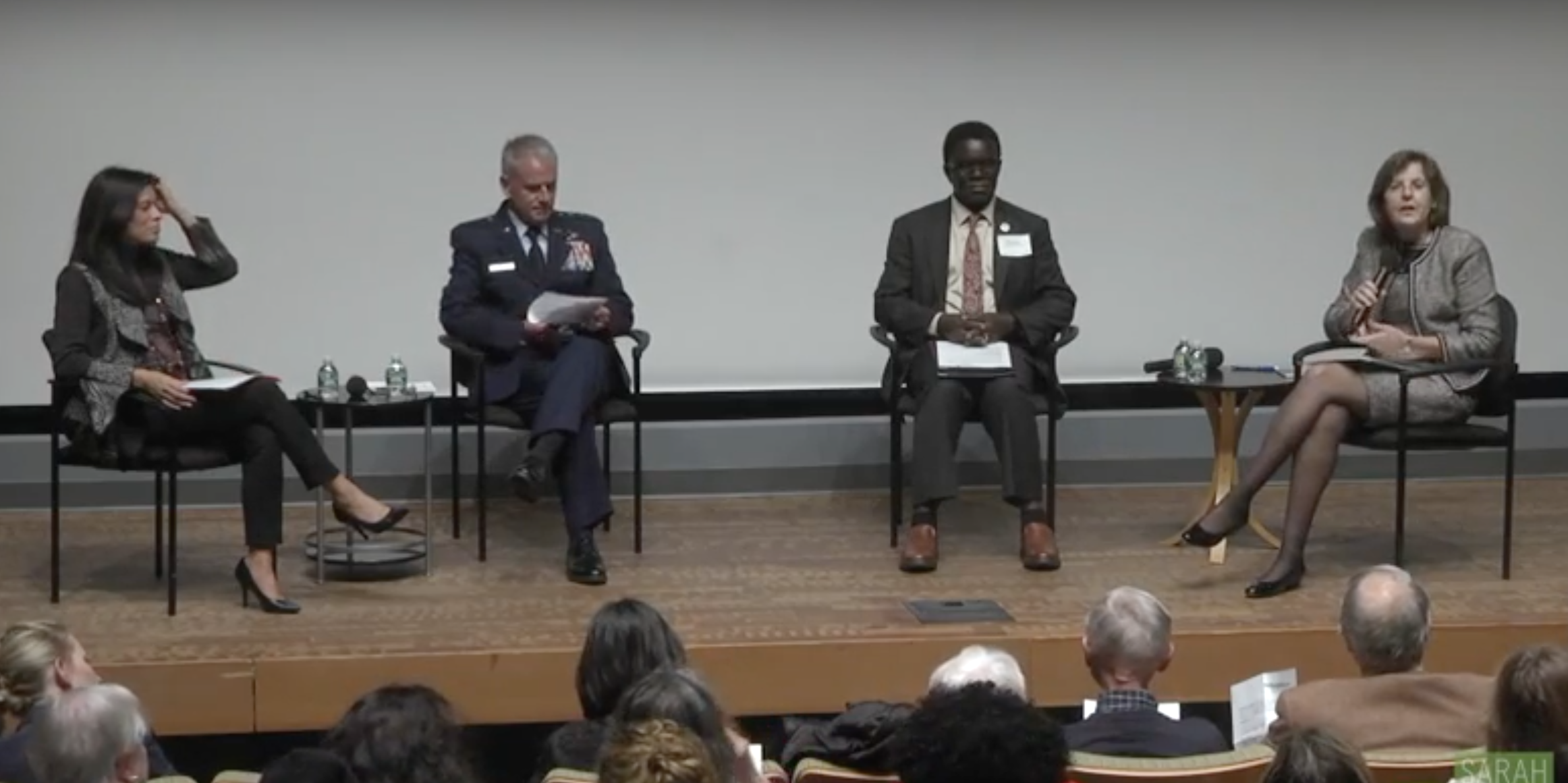Students press President Judd during Presidential Panel in follow-up to Abrams controversy
From left to right: Laura Sparks, the president of The Cooper Union for Advancement of Science and Art; Lt. Gen. Jay Silveria, superintendent of the U.S. Air Force Academy; Thomas Isekenegbe, president of Bronx Community College; Cristle Collins Judd, president of Sarah Lawrence College
This Monday, Nov. 5, a panel on issues of differences in dialogue was overwhelmed by student protest in response to the school-wide controversy regarding Sam Abrams' op-ed.
The event invited presidential leadership from three colleges and academies, with an aim to have a moderated conversation about how each leader dealt with dissenting opinions at their respective institution. The guests invited were Laura Sparks, the president of The Cooper Union for Advancement of Science and Art; Thomas Isekenegbe, president of Bronx Community College; and Lt. Gen. Jay Silveria, superintendent of the U.S. Air Force Academy.
“When we planned this event months ago I suspected that one or more of the campuses represented would be facing challenging issues, but that I hadn’t necessarily expected it to be ours,” President Judd remarked, in an email sent the morning following the event.
Though the event had no official tie to the dialogue concerning the administration’s response to the Professor Abrams’ op-ed, students took it as an opportunity to question Judd directly. Among them sat Kieran Pilling, ‘21. Hours before the panel, Pilling made a Facebook post calling for students to fill the auditorium “beyond capacity” as a protest.
“Are you angry that the Sarah Lawrence College administration has stood by Samuel Abrams?” Pilling asked in his Facebook post. “A man who not only feeds into the right-wing falsehood of the ‘silencing of free speech’ but actively discredited our school in a national newspaper?”
Organization was swift; students filled the majority of the audience in both the lower and upper level of the Heimbold Donnelly Theatre.
In her introduction, President Cristle Collins Judd affirmed Abrams’ right to publish his op-ed.
“Academic freedom is a fundamental principle of Sarah Lawrence College. That means, as a member of our faculty, Professor Sam Abrams has a right, and the full support of the College, to pursue and publish his work.”
She went on to emphasize the important of vigorous and informed debate as the correct and respectable response to Abrams’ article or any similar event, as opposed to intimidation and defamation.
Judd was referring to the signs left on Abrams’ door the day his op-ed was published, among other student responses.
To start the discussion, Judd presented a video of Silveria addressing his school after a series of racist slurs were written around the campus of the Academy’s prep school.
In the video, Silveria says, “The appropriate response for horrible language and horrible ideas is a better idea. What we should have is a civil discourse and talk about these issues. That’s a better idea.”
Following Silveria’s comments, Isekenegbe spoke about dealing with a segregated student body at his school, and Sparks described the recent protests at her school, when students demanded greater diversity within the faculty and curriculum.
“My predecessor did not do a very good job of bringing those groups together,” Isekenegbe said, referring to the racial makeup of the student body: 61% Hispanic, 23% African-American, the remaining 16% a mix of white and other groups. “For me, working together and collaboration is very important. There is no way you can get work done if you can’t bring people together, and the key word for me is respect. It’s a two-way street.”
When asked about the intersection of diversity and inclusivity, Sparks said, “It takes having a diversity of identities and a diversity of life experiences in a conversation to build a kind of trust to is required to have an understanding of one another’s viewpoints.”
Some students, including Pilling, left the theater feeling disappointed by what was said, and by what was not.
“I was hoping that I could have a solid stance from Cristle on how we could go forward on the issues we currently have on campus,” Pilling told the Phoenix. He added that he felt like the panel was just “four presidents of colleges having a chat but not really having any sort of discussion.”
“I think that Cristle dismissed something that I hold very personal, which is the idea that personal is political,” Lily Cantor, 20, told the Phoenix. “When Sam Abrams is angry that the school is sponsoring events for LGBT students and for women’s rights, I’m a lesbian, I’m a woman, so he is politically attacking my personhood, and we can’t separate that.”
Sophomore Maryanne Roughton, on the other hand, left the event with hope.
“They were really encouraging active dialogue between extremely different parties,” she said. “There are conservative minds, like Sam Abrams, on this campus. If we want to have any kind of understanding and progress made, we need to include them.”
One student stood and asked the panel about what Abrams was referring to with his now-infamous phrase, “meaningful ideological alternatives.”
“If you are only in an echo chamber, we will not have served you well, because getting uncomfortable is what leads you forward into knowing what you really believe,” Judd responded.
In the end, Judd was appreciative of the critical questions students asked.
“I hope everybody who was here has some part of it that they take out with somebody and says, ‘you know, I want to think about this more’ or ‘this part troubled me’ or ‘I don’t think that was a very good answer to that,’” Judd told the Phoenix. “If we are engendering those kinds of responses, then this series is doing what we hope it will do.”
The panel was the first in a series of events within the theme of “Difference in Dialogue.” The next event in the series will be “Probing the Bounds of Free Speech,” with DeRay McKesson and Sanford Ungar on November 14th.
Amali Gordon-Buxbaum ‘2

